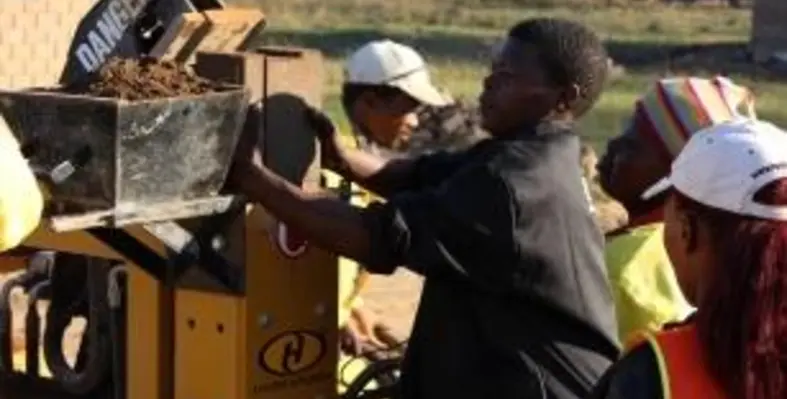A South African brick-making machinery firm has helped to contribute to the construction of affordable homes locally
As part of the government's commitment to development, the Radway Green Farm community, just outside of Grahamstown in the country’s Eastern Cape region, was to be provided with permanent shelter during a process that would offer them employment while teaching them invaluable skills.
Hydraform has been a forerunner in the industry for close to three decades, supplying interlocking block-making machinery to a growing market and offering the necessary training and skills development to inform and enhance the user’s experience of the machinery.
This existing model fed into the company’s extended offering to deliver turnkey solutions for specialised housing delivery.
Hydraform sales and marketing director Nazlie Dickson, said, “The opportunity this initiative gave us was to implement our own project and prove that a community can be transformed and enabled by participating in local construction in a short period of time and enjoy benefits beyond housing delivery.”
Beyond supplying machinery, Hydraform’s participation in this project has helped create not only shelter for citizens, but has involved the community in the construction of their own houses.
Radway Green Farm community members have also benefited from being gainfully employed during this process, acquiring the necessary transferable skills in both construction and block-making using Hydraform’s technology.
“The community members we employed for this project previously had no transferable skills other than farming,” said Dickson. “Now they have the ability to produce blocks and build using Hydraform interlocking building technology.
“A key objective of the project was to ensure that the community members were not only beneficiaries of homes, but that they were trained in block-making and construction as part of their skills development. The community produced 150,000 blocks that went into building their houses.”
Mobile technology
The Hydraform block-making machinery was transported to site, ensuring the product that didn’t have to travel far to get to its destination, which substantially reduced transportation costs in addition to making the product more energy efficient.
The Radway Green Farm project also offered a unique set-up to test out the versatility and robust nature of the machinery.
“The project itself is in a rural setting where there are no formal water and power facilities or supply,” explained Dickson. “But this made no difference to the performance of our machinery, which is highly mobile and can produce blocks on site.”
Hydraform block-making machinery provides smart solutions to the logistical challenges presented by a rural build and due to its innovative dry-stacking method, the final product has a lower embodied energy than traditional bricks and blocks. “Hydraform blocks are not baked or fired, which saves a remarkable amount of energy,” Dickson added. “The dry-stack interlocking technology also saves construction time and cement costs as well as providing materials with less embodied energy, contributing to a structure that is greener overall.
“This project is a self-sustainable and independent development that included solar power generation, a waste management system as well as water delivery.”
The future of housing delivery
Hydraform’s product offering is uniquely positioned to serve developing countries in their quest for infrastructure development and stability due to its inherent adaptability. “Our products are able to work around infrastructural constraints and still deliver housing, public buildings, clinics and schools, even in the most remote areas,” Dickson asserted.
The Radway Green project began in March 2015 and was completed in July 2015, on time and within budget.
While the project houses a number of families – helping to restore dignity to a previously displaced community – it is also a meaningful showcase of Hydraform’s project management skills and unique technologies that are well-suited to local housing delivery.
“We were able to show that Hydraform technology can be employed by a local community, allowing them the full benefit of participating in project development while learning new and invaluable skills and, in turn, improving their living standards,” commented Dickson. “Projects like this prove that we are able to adapt to market needs and, in this case, the affordable housing market, by providing specialised and dynamic turnkey housing delivery options.
“This extended offering means we make meaningful contributions to South Africa’s job creation, skills development and community upliftment objectives.”














